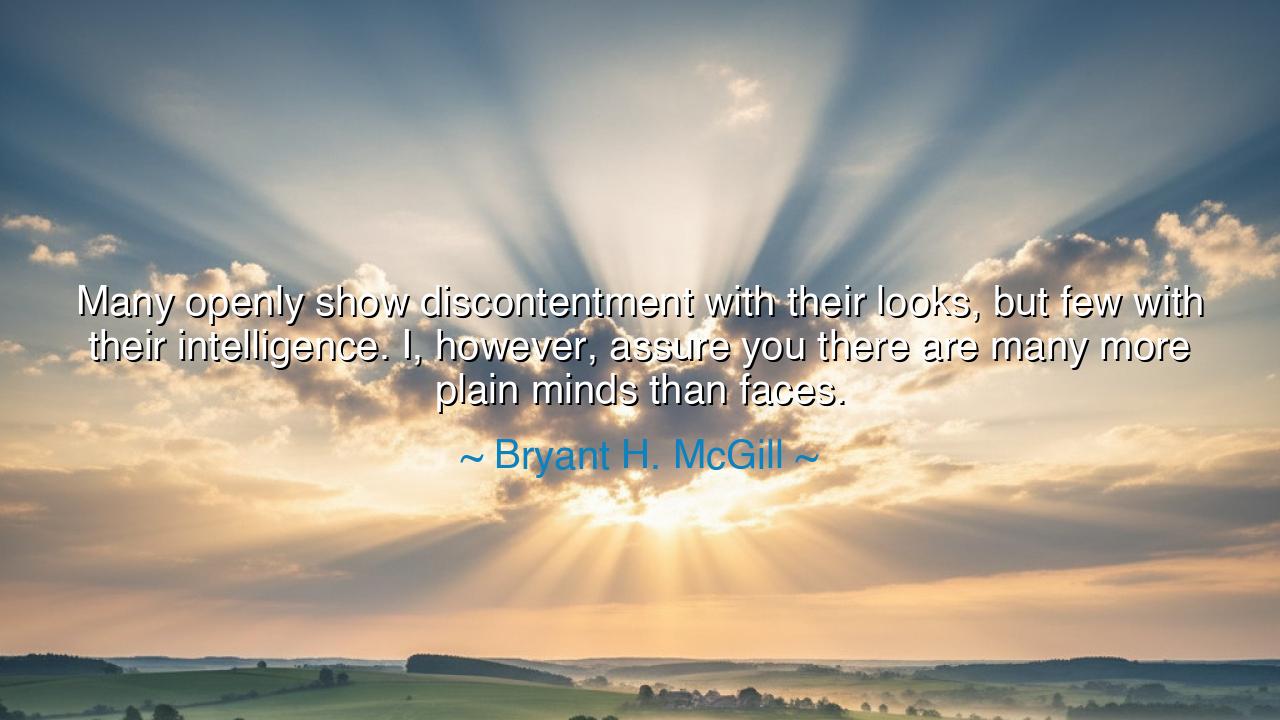
Many openly show discontentment with their looks, but few with
Many openly show discontentment with their looks, but few with their intelligence. I, however, assure you there are many more plain minds than faces.






The words of Bryant H. McGill, philosopher and student of the human condition, pierce like a mirror held to our vanity: “Many openly show discontentment with their looks, but few with their intelligence. I, however, assure you there are many more plain minds than faces.” In this single sentence lies both irony and revelation — a sharp reminder that the world worships appearance more than understanding, that men and women would rather perfect their reflection than their reason. McGill’s observation is not meant to wound but to awaken — to shake us from the comfortable illusion that wisdom will blossom without cultivation, that intelligence, once given, will keep its radiance without care or growth.
The origin of this quote emerges from McGill’s lifelong contemplation on human potential and complacency. Known for his writings on empowerment and mindfulness, he sought to expose the subtle hypocrisies that keep mankind bound in mediocrity. He saw a world obsessed with image — a culture where mirrors outnumbered books, and self-presentation outweighed self-knowledge. Thus, his words strike not as mere criticism, but as lament and challenge: that we, who spend so much effort adorning our skin, neglect the mind, the truer vessel of beauty and strength. McGill reminds us that there are far more plain minds than faces — not because intelligence is rare, but because it is rarely tended.
To say that “few show discontentment with their intelligence” is to reveal a deep human blindness. We are quick to notice the imperfections of the body because they are seen, but we turn away from the flaws of the mind because they are felt — and feeling them requires humility. Vanity recoils from self-examination. It is easy to confess dissatisfaction with our looks; it costs nothing but pride. But to admit the dullness of our thought, the limits of our comprehension, demands courage. The ancient philosophers called this courage philosophia — the love of wisdom. It is the fire that drives the soul to learn, to question, to rise. Yet few seek this flame. Most are content with the dim light of borrowed opinions, mistaking knowledge for intelligence, and repetition for understanding.
Consider, if you will, the story of Socrates, the wisest man of ancient Greece — not because he knew much, but because he knew that he knew little. When the Oracle of Delphi declared him the wisest, he was perplexed. He walked among the people, questioning poets, politicians, and craftsmen, only to discover that most thought themselves wise though their knowledge was hollow. Socrates alone confessed his ignorance — and in that humility lay his greatness. His mind, though “plain” by worldly measure, was vast because it was open. Through him we learn that the first step toward intelligence is the recognition of one’s ignorance, and that pride is the first enemy of wisdom.
McGill’s insight burns with the same timeless truth. A beautiful face may turn heads, but a beautiful mind turns the course of history. Yet while beauty fades with years, the mind can grow ever more radiant. And still, how many neglect this divine instrument! How many decorate the house but let the soul decay! The world overflows with cleverness, but not with clarity; with noise, but not with thought. Thus, McGill’s words fall as a call to arms — a quiet but urgent demand that we turn inward and begin the work that vanity avoids. For if we neglect to polish the mirror of the mind, the image of our soul will remain dim and distorted, no matter how fair the face that hides it.
The lesson is clear: strive to adorn your mind as carefully as you adorn your body. Seek not only to appear intelligent but to become intelligent — to feed your understanding with curiosity, humility, and discipline. Read not to impress, but to awaken; speak not to be heard, but to seek truth. Let your dissatisfaction with ignorance be as strong as your dissatisfaction with imperfection. Do not fear the plainness of your face; fear instead the plainness of your thought. For true beauty radiates from the depth of perception, from kindness and comprehension, from the noble art of seeing the world as it is and striving to make it better.
So, O seeker of wisdom, take these words to heart. When next you stand before the mirror, remember that your reflection is but a shadow of who you are. The truer reflection lies within — in how you think, how you learn, how you evolve. Cultivate your intelligence as an artist shapes marble, patiently, passionately, and with reverence. For time will weather your face, but it cannot age a mind devoted to growth. As Bryant McGill teaches, there are many more plain minds than faces — but yours need not be among them, if only you dare to polish the brilliance already waiting inside you.






AAdministratorAdministrator
Welcome, honored guests. Please leave a comment, we will respond soon